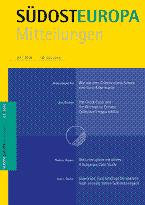How Do Anti-corruption Initiatives Fly ... And Where to? – A Bulgarian Case Study
How Do Anti-corruption Initiatives Fly ... And Where to? – A Bulgarian Case Study
Author(s): Nadége RagaruSubject(s): Politics / Political Sciences
Published by: Südosteuropa Gesellschaft e.V.
Summary/Abstract: In the past years, corruption in Bulgaria has become a dominant issue on the international agenda. While a variety of local and international actors have vowed to sanction breaches of public morality, the results of anti-corruption initiatives remain disappointing. How can we explain this perceived failure? The article seeks to target this and other issues relating to the politics and policies of anticorruption: Which affairs are prioritized and why? How do legal proceedings impact the actual behavior of public officials and corporate business? – Building on the examination of a corruption case at Sofia’s heating company, the article argues that the reasons behind the low effectiveness of anti-corruption measures need to be traced to the ways in which anti-corruption has become an arena where competing networks of actors (in the police, the judiciary and the political sphere) seek to strengthen their own institutional positions, to promote divergent definitions of the public good or to settle (at times unrelated) disputes. The selection of cases incriminated as well as the outcome of the legal proceedings are thus likely to tell us more about the balance of power between the various protagonists than about the actual map of corrupt practices in Bulgaria. In addition, although anti-corruption initiatives do have an impact on the anticipations and strategies of public officials and private businessmen – including an increasing recourse to legal expertise –, they do not necessarily result in more transparent political and economic practices.
Journal: Südosteuropa Mitteilungen
- Issue Year: 2010
- Issue No: 03
- Page Range: 40-63
- Page Count: 24
- Language: English
- Content File-PDF

